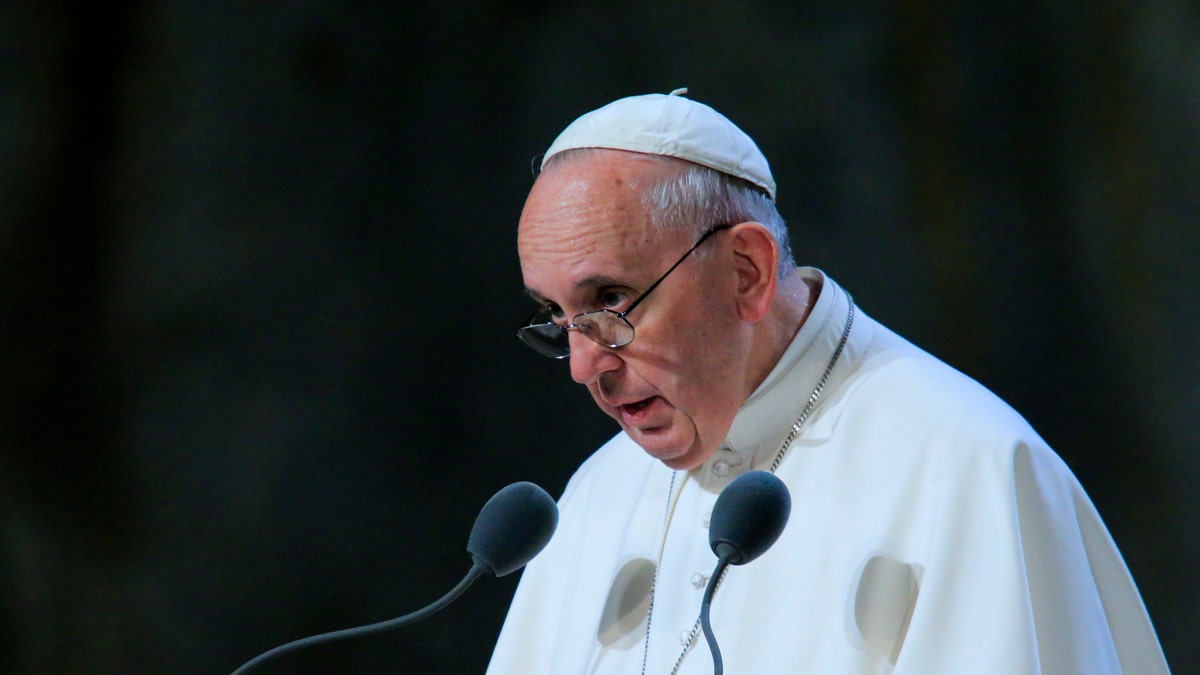
WASHINGTON, DC - SEPTEMBER 25: Pope Francis speaks to attendees inside of the 9/11 Memorial Museum September 25, 2015 in New York City. Pope Francis is on a six-day trip to the United States, which includes stops in Washington DC, New York and Philadelphia. (Photo by Eduardo Munoz-Pool/Getty Images) (2015 Getty Images)
In a major document about families entitled "The Joy of Love," Pope Francis demanded Friday a shift in the church’s emphasis from doctrine to mercy and suggested innovative openings in pastoral practice for Catholics who are divorced.
Church teaching holds that unless these Catholics receive an annulment, or a church decree that their first marriage was invalid, they are committing adultery and cannot receive Communion.
Conservatives had insisted that the rules were fixed and that there was no way around Christ's teaching on the indissolubility of marriage. Progressives had sought wiggle room to balance doctrine with mercy and look at each couple on a case-by-case basis, accompanying them on a path of reconciliation that could lead to them eventually receiving the sacraments.
Francis took a unilateral step last year and changed church law to make it easier to get an annulment. On Friday, he said the rigorous response proposed by the conservatives was inconsistent with Jesus' message of mercy.
"By thinking that everything is black and white, we sometimes close off the way of grace and of growth and discourage paths of sanctification which give glory to God," he said. "Let us remember that a small step in the midst of great human limitations can be more pleasing to God than a life which appears outwardly in order but moves through the day without confronting great difficulties."
Francis didn't explicitly endorse the "penitential path" of bringing such civilly remarried Catholics to Communion that was advocated by leading progressives such as Cardinal Walter Kasper. But he repeated what the synod had endorsed of the need for pastors to help individual Catholics over the course of spiritual direction to ascertain what God is asking of them.
The Argentinian pontiff said the church must no longer sit in judgment and "throw stones" at those who fail to live up to the Gospel's ideals of marriage and family life.
"I understand those who prefer a more rigorous pastoral care which leaves no room for confusion," he wrote. "But I sincerely believe that Jesus wants a church attentive to the goodness which the Holy Spirit sows in the midst of human weakness."
On thorny issues such as contraception, Francis stressed that a couple's individual conscience — not dogmatic rules imposed on them across the board — must guide their decisions and the church's pastoral practice.
"We have been called to form consciences, not replace to them," he said.
He insisted the church's aim is to reintegrate and welcome all its members. He called for a new language to help Catholic families cope with today's problems. And he said pastors must take into account mitigating factors — fear, ignorance, habits and duress — in counseling Catholics who simply aren't perfect.
"It can no longer simply be said that all those in any irregular situations are living in a state of mortal sin and are deprived of sanctifying grace," he wrote. Even those in an "objective situation of sin" can be in a state of grace, and can even be more pleasing to God by trying to improve, he said.
Cardinal Christoph Schoenborn, the archbishop of Vienna, told a Vatican press conference that while there was no explicit change in church doctrine about the family, the document contained an "organic development" in church teaching.
"It's the classic case of an organic development of doctrine. There is innovation and continuity," he said. "There are true novelties in this document, but no ruptures."
The document's release marks the culmination of a divisive two-year consultation of ordinary Catholics and the church hierarchy that Francis initiated in hopes of understanding the problems facing Catholic families today and providing them with better pastoral care.
Based on reporting by the Associated Press.
